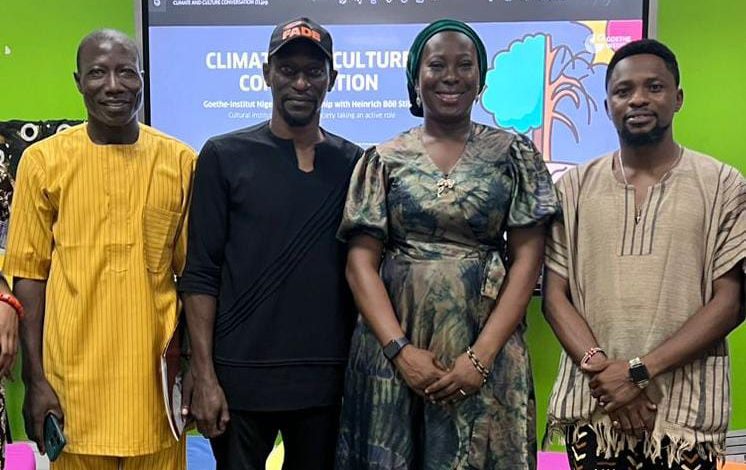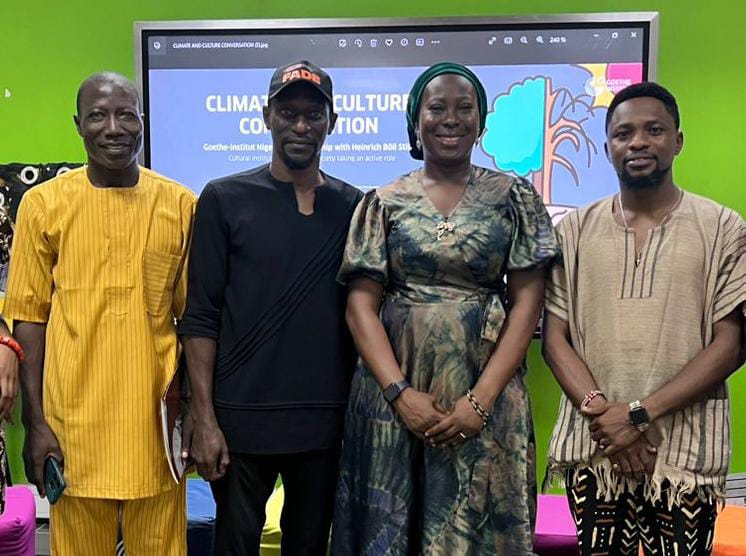Experts lament impact of climate change on culture, environment, food security

By Silver Nwokoro
EXPERTS in the cultural and environmental sector have continued to decry the adverse effect of climate change on culture, the environment, livelihoods and food security. They therefore urged everyone to make adjustments in practices designed to reverse climate’s onslaught. According to them, the climate crisis is not just a matter of scientific data or political policies, it is fundamentally a cultural crisis. They stated this at the maiden edition of a one-day conversation on climate and culture held in Lagos and organised by Goethe-Institut Lagos in partnership with Henrich-Böll-Stiftung. The aim of the conversation was to contribute to global efforts to combat climate change, ensure cultural preservation and work for environmental sustainability and a greener earth that guarantees the future of mankind. It came in the heels of COP28, the United Nation’s Climate Change Conference being held in Dubai, United Arab Emirate.
Stakeholders in the one-day climate and culture conversation included the Director of Antiquities and Curator for National Museum, Lagos, Mr. Linus Kasai Kingi, Project Manager of FADE Africa, Mr. Chukwuemeka Jibunoh, Environmental Sustainability Communicator, Mrs. Temitope Okunnu and ‘Mr. Climate’, Mr. Olumide Idowu. Founder of Fight Against Desert Encroachment (FADE) and DIDI Museum, Dr. Newton Jibunor, addressed the audience in a pre-recorded video. The session was jointly moderated by the duo of Chiamaka Onyenekwe and Patrick Odimnfe. Director of Goethe-Institut Dr. Nadine Siegert was among the participants.
In his keynote, Deji Akinpelu of REthinking Cities sued for the use of traditional ways of doing things to reduce carbon emissions. “Firstly, let us advocate for and promote non-motorized transportation,” Akinpelu said. “Encourage the use of bicycles, walking, and other eco-friendly means of travel to cultural events. By doing so, we not only reduce carbon emissions but also foster a healthier, more sustainable way of engaging with our surroundings. Secondly, let us support the integration of informal waste collectors. Acknowledge the valuable role they play in our communities and collaborate with them to enhance waste management practices. This inclusivity ensures a more comprehensive approach to sustainability.

Deputy Director of Antiquities Protection and Curator, National Museum, Lagos, Linus Kasai Kingi (left); Project Manager, FADE Africa, Chukwuemeka Jibunoh; Environmental Sustainability Communicator, Temitope Okunnu and ‘Mr. Climate’, Olumide Idowu after the panel session on climate and culture conversation at Goethe-Institut, Lagos
“Thirdly, let us champion extended producer responsibilities. Cultural organizations can take a lead by ensuring that producers, especially in the realm of plastics, are accountable for the entire life cycle of their products. This involves reducing single-use plastics, promoting recycling, and actively seeking alternatives. Beyond these actions, we must explore and implement additional measures. These may include embracing renewable energy sources for cultural events, adopting eco-friendly materials for production, and educating our audiences about sustainable practices.”
Odimnfe said climate change is impacting people’s lives directly, indirectly and collectively as a community, adding, “The idea is that we want more institutions to key into this kind of conversation. When it expands, more people will be doing this real work of environmental sustainability; that is to create gardens using composting to grow food or pushing for better disposal of waste.”
Director of Goethe-Institut, Lagos, Dr. Nadine Siegert noted that the conversation is on how to reduce the negative impact of climate change and other environmental issues, noting, “There are lot of negative impact of climate change not only on societies but also on culture. There are people changing their cultural practices because not everything is available anymore. There is a huge impact of climate change on culture practices, how people have to change because people are not able to do what they do anymore because the surroundings, the eco system has changed.”
Founder of environmentally sustainable organisation, FABE International, Okunnu urged farmers and everyone to promote and sustain Nigeria’s farming culture, urging them to desist from using chemicals on their farm produce. She noted that chemicals being applied to weed or grow foods have negative impact on human health, adding that chemical elimination will go a long way in promoting a sustainable environment. Okunnu advocated collective rather than individual action in the fight against climate change, saying, “In a collective process, you influence your neighbour. This brings us to organisational structure. The 17 Sustainable Development Goals (SDGs) help us to understand our culture. In spite of industrial farming, it doesn’t mean we have to forget our culture. We advocate use of composting for rural farmers instead of synthetic fertilisers or chemicals for sustainable agricultural practice.” Okunnu said her FABE organisation has taken the climate change education and campaign to school children and rural farmers for better appreciation.
A curator at National Museum, Lagos, Kingi encouraged the use of cultural practices in museums, saying that by displaying ancient cultural materials for people to see promotes culture. Kingi said climate change has really affected culture, especially the work of artists – carvers and weaver using natural materials from forests – who now have a hard time sourcing them due to climate effect that does not allow for replenishment. At the museum, according to Kingi, “We encourage cultural practice, which is evidence of human materials over time. In doing so, we make communities take pride in what their ancestors have done over time.” He, however, argued that climate change discourse “has been shrouded in intellectual ideologue. The worry is that the discourse has not been driven to the common man’s level for his understanding.”
‘Mr. Climate’ Idowu argued that there was need to incorporate indigenous culture knowledge systems into the climate change discourse, saying, “There’s indigenous knowledge that informs understanding of culture and climate,” but regretted that Nigeria was not yet in the equation of serious climate change action, especially curtailing the use of fossil fuel in the foreseeable future. He said the country lacked required action and political will to act decisively.
Jibunoh shared the proud work FADE did in Makoda, a community in the north chased away by desertification. But through FADE’s 3,000-tree planting intervention, the community members returned after about four years to resume normal life. It will be recalled that the founder of FADE, Dr. Newton Jibunoh travelled through the Sahara Desert to North Africa and Europe to campaign against desertification, an arduous journey he said did not receive commensurate action from African governments to sustain FADE’s momentum. “What we are about is sustainability by planting trees and other agencies that work against climate change,” Chukwuemeka Jibunoh said. “Indigenous practices go a long way. Our ancestors tried to mitigate climate change in their own ways. We need to sustain that momentum.”



